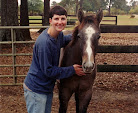Auditor: "But
there's a right way and a wrong way."
Mark: "No,
there's a right way and a *long* way."
One of the most
refreshing things about Mark Rashid is that he doesn’t see problems. He sees
how he would like things to be inside him and inside the horse and between the
two of them, and then he does what he needs to do to communicate that to the
horse. He doesn’t get lost in what the horse is doing.
Of course he’s
aware of what the horse is doing, but that isn’t his focus, and he doesn’t see
it—whatever it is—as a problem. Nor does he go to analyzing it or
troubleshooting it. He just calmly stays with what he’s asking the horse to do.
If the horse needs him to do something different, he will, but it won’t be a
big deal.
Lots of people
talk about looking for solutions instead of looking at problems, but Mark lives
it. His mindset and the very words he chooses just don’t admit problems.
I will always have
in my memory an image of Mark at a demo with a fairly substantial person
holding onto his wrist and putting their entire effort and strength into
holding Mark in one spot. Mark, however, was calmly walking around where he
wanted while the person who was holding him strained and twisted and wound up off
balance and in a mess.
Mark first
explained and demonstrated that, when he thought about the fact that another
person had his wrist, he literally couldn’t go anywhere. However, when he
remembered that he had control of all the rest of his body and focused on that,
he could move easily.
It was more than a
mental trick. When our minds identify a problem, two things happen. First, in
thinking of something as a problem, we tend to brace, which usually just makes
us part of the problem. Second, when we focus on a problem, our minds go to
where the problem is. When this happens, we have lost our center and therefore
our ability to shape what happens next. We are off balance both emotionally and
physically.
When we come back
to our center, we are at our ground zero for both making decisions and moving
our bodies, and we have, at that point, a lot of options.
Studying with Mark
has made me realize how often my mind is out, not just finding problems, but
hanging out with them, developing a nice cozy relationship with them, and
quickly forgetting that there is any part of the world that is not a problem.
If my horse does something—anything—that I didn’t ask for, my mind immediately
lights up with, “Ooo, a problem!” And so derailment begins.
Obviously the
first key here is that I am finding the behavior problematic. Labeling it a
problem means that I am braced against it. I have also lost, not only my
center, but my connection with my horse because my mind has disengaged with him
in order to engage with the “problem.”
The second part of
the deal is that, once my focus goes to the “problem,” that leaves exactly
nobody focusing on the original plan. So we started out with my having one idea
and the horse maybe having a different one, but now that I’m focusing on what
he’s doing, then we're both having the horse's idea instead. And he wasn't
necessarily all that married to his idea, but now that I'm over there in it
with him, where else are we likely to go?
Here’s an example
of what that looks like: I was working with a horse named Sebastian doing
transitions from inside of me using just a change of energy. Sebastian would
generally shift his energy in response to mine, but not always to the point of
changing gait. So I would change my energy from, say, trot to walk, and
Sebastian would change his noticeably but still be in the trot. At this point I
tended to focus on the fact that he was still in the trot, which meant that my
brain was where? On trotting. Which meant that we stayed doing what? Trotting.
Mark explained that the key was for me not to get distracted by what Sebastian
was doing but keep my idea and energy at the walk until he found it.
Once again, as
always, this stuff applies way beyond horsemanship. Show of hands: how many
people spend the majority of their time seeing and solving problems? (Those of
us who are particularly advanced in this field have even been known to *create*
problems from time to time.) What would life be like if, instead of letting our
attention get sucked into the problems, we calmly carried on with a positive,
happy focus on what we originally intended to do?




No comments:
Post a Comment